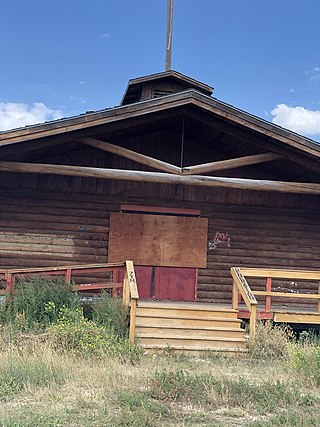Related Research Articles

The Lakota are a Native American people. Also known as the Teton Sioux, they are one of the three prominent subcultures of the Sioux people. Their current lands are in North and South Dakota. They speak Lakȟótiyapi—the Lakota language, the westernmost of three closely related languages that belong to the Siouan language family.

The Sioux or Oceti Sakowin are groups of Native American tribes and First Nations peoples in North America. The modern Sioux consist of two major divisions based on language divisions: the Dakota and Lakota; collectively they are known as the Očhéthi Šakówiŋ. The term "Sioux" is an exonym created from a French transcription ("Nadouessioux") of the Ojibwe term "Nadowessi", and can refer to any ethnic group within the Great Sioux Nation or to any of the nation's many language dialects.

Tribal sovereignty in the United States is the concept of the inherent authority of indigenous tribes to govern themselves within the borders of the United States.

The Pine Ridge Indian Reservation, also called Pine Ridge Agency, is an Oglala Lakota Indian reservation located almost entirely within the U.S. state of South Dakota, with a small portion in Nebraska. Originally included within the territory of the Great Sioux Reservation, Pine Ridge was created by the Act of March 2, 1889, 25 Stat. 888. in the southwest corner of South Dakota on the Nebraska border. Today it consists of 3,468.85 sq mi (8,984 km2) of land area and is one of the largest reservations in the United States.

Whiteclay is an unincorporated community and census-designated place in Sheridan County, Nebraska, United States. The population was 10 at the 2010 census.

The Great Sioux Reservation initially set aside land west of the Missouri River in South Dakota and Nebraska for the use of the Lakota Sioux, who had dominated this territory. The reservation was established in the Fort Laramie Treaty of 1868. It included all of present-day western South Dakota and modern Boyd County, Nebraska. This area was established by the United States as a reservation for the Teton Sioux, also known as the Lakota: the seven western bands of the "Seven Council Fires".

The Rosebud Indian Reservation is an Indian reservation in South Dakota, United States. It is the home of the federally recognized Rosebud Sioux Tribe, who are Sicangu, a band of Lakota people. The Lakota name Sicangu Oyate translates as the "Burnt Thigh Nation," also known by the French term, the Brulé Sioux.
Cecilia Fire Thunder is a nurse, community health planner and tribal leader of the Oglala Sioux. On November 2, 2004, she was the first woman elected as president of the Tribe. She served until being impeached on June 29, 2006, several months short of the two-year term. The major controversy was over her effort to build a Planned Parenthood clinic on the reservation after the South Dakota legislature banned most abortions throughout the state. The tribal council impeached her for proceeding without gaining their consensus.

The Wounded Knee Occupation, also known as Second Wounded Knee, began on February 27, 1973, when approximately 200 Oglala Lakota and followers of the American Indian Movement (AIM) seized and occupied the town of Wounded Knee, South Dakota, United States, on the Pine Ridge Indian Reservation. The protest followed the failure of an effort of the Oglala Sioux Civil Rights Organization (OSCRO) to use impeachment to remove tribal president Richard Wilson, whom they accused of corruption and abuse of opponents. Additionally, protesters criticized the United States government's failure to fulfill treaties with Native American people and demanded the reopening of treaty negotiations to hopefully arrive at fair and equitable treatment of Native Americans.
Alex White Plume is the former vice president and president of the Oglala Sioux Tribe of the Pine Ridge Reservation, located on South Dakota of the United States. He served as president from June 30, 2006 to November 2006 after Cecilia Fire Thunder was impeached.
Richard A. Wilson was elected chairman of the Oglala Lakota of the Pine Ridge Indian Reservation in South Dakota, where he served from 1972–1976, following re-election in 1974.

The Oglala are one of the seven subtribes of the Lakota people who, along with the Dakota, make up the Očhéthi Šakówiŋ. A majority of the Oglala live on the Pine Ridge Indian Reservation in South Dakota, the eighth-largest Native American reservation in the United States.
Theresa B. "Huck" Two Bulls was an attorney, prosecutor and politician in the United States and the Oglala Sioux Tribe. In 2004 she was elected as Democratic member of the South Dakota Senate, representing the 27th district, the first American Indian woman to be elected to the state legislature. She served until 2008. That year Two Bulls was elected as president of the Oglala Sioux Tribe of the Pine Ridge Reservation, the second woman to serve in this position. She served one term, which was two years.
Hodel v. Irving, 481 U.S. 704 (1987), is a case in which the U.S. Supreme Court held that a statute ordering the escheat of fractional interests in real property which had been bequeathed to members of the Oglala Sioux tribe was an unconstitutional taking which required just compensation.
United States v. Lara, 541 U.S. 193 (2004), was a United States Supreme Court landmark case which held that both the United States and a Native American (Indian) tribe could prosecute an Indian for the same acts that constituted crimes in both jurisdictions. The Court held that the United States and the tribe were separate sovereigns; therefore, separate tribal and federal prosecutions did not violate the Double Jeopardy Clause.

The United States government stole the Black Hills – a mountain range in the US states of South Dakota and Wyoming – from the Sioux Nation in 1876. The land was pledged to the Sioux Nation in the Treaty of Fort Laramie, but a few years later the United States illegally seized the land and nullified the treaty with the Indian Appropriations Bill of 1876, without the tribe's consent. That bill "denied the Sioux all further appropriation and treaty-guaranteed annuities" until they gave up the Black Hills. A Supreme Court case was ruled in favor of the Sioux in 1980. The Sioux have outstanding issues with the ruling and have not collected the funds. As of 2011, the award was worth over $1 billion.

The Guardians of the Oglala Nation (GOON) was an American paramilitary group established in 1972 by Oglala tribal chairman Dick Wilson under authority of the Oglala Sioux Tribal Council. It operated on the Pine Ridge Indian Reservation during the early 1970's, and was disbanded after a new chairman was elected in 1976.
Ex parte Crow Dog, 109 U.S. 556 (1883), is a landmark decision of the Supreme Court of the United States that followed the death of one member of a Native American tribe at the hands of another on reservation land. Crow Dog was a member of the Brulé band of the Lakota Sioux. On August 5, 1881 he shot and killed Spotted Tail, a Lakota chief; there are different accounts of the background to the killing. The tribal council dealt with the incident according to Sioux tradition, and Crow Dog paid restitution to the dead man's family. However, the U.S. authorities then prosecuted Crow Dog for murder in a federal court. He was found guilty and sentenced to hang.
United States v. Quiver, 241 U.S. 602 (1916), is a case decided by the United States Supreme Court after first appearing in United States District Court for the District of South Dakota. The case argued on February 28, 1916 and decided on June 12, 1916 concerned adultery committed on the Pine Ridge Indian Reservation in South Dakota between two enrolled members of the Oglala Sioux Tribe. The district court had held that adultery committed by an Indian with another Indian on an Indian reservation was not punishable under the act of March 3, 1887, c. 397, 24 Stat. 635, now § 316 of the Penal Code. This decision was made because the offense occurred on a Sioux Indian reservation which is not said to be under jurisdiction of the district court. The United States Supreme Court affirmed the judgment of the district court saying that the adultery was not punishable as it had occurred between two American Indians on an American Indian reservation.

Cannabis on American Indian reservations historically largely fell under the same regulations as cannabis nationwide in the United States. However, the August 2013 issuance of the Cole Memorandum opened discussion on tribal sovereignty as pertains to cannabis legalization, which was further explored as the states of Washington and Colorado legalized marijuana. A clarifying memo in December 2014 stated that the federal government's non-interference policies that applied to the 50 states, would also apply to the 326 recognized American Indian reservations. U.S. Attorney for Oregon, Amanda Marshall, stated that the clarification had been issued in response to legal questions from tribal nations, but that only three unnamed tribes, in California, Washington state, and "the Midwest" had stated explicit interest in legalizing.
References
- ↑ Bruce Elliott Johansen: The encyclopedia of Native American legal tradition, pp. 155-156, Greenwood (1998) ISBN 0-313-30167-0
- ↑ Mario Gonzalez, Elizabeth Lynn Cook: The Politics of Hallowed Ground: Wounded Knee and the Struggle for Indian Sovereignty, p. 372, University of Illinois Press; (1998) ISBN 0-252-06669-3